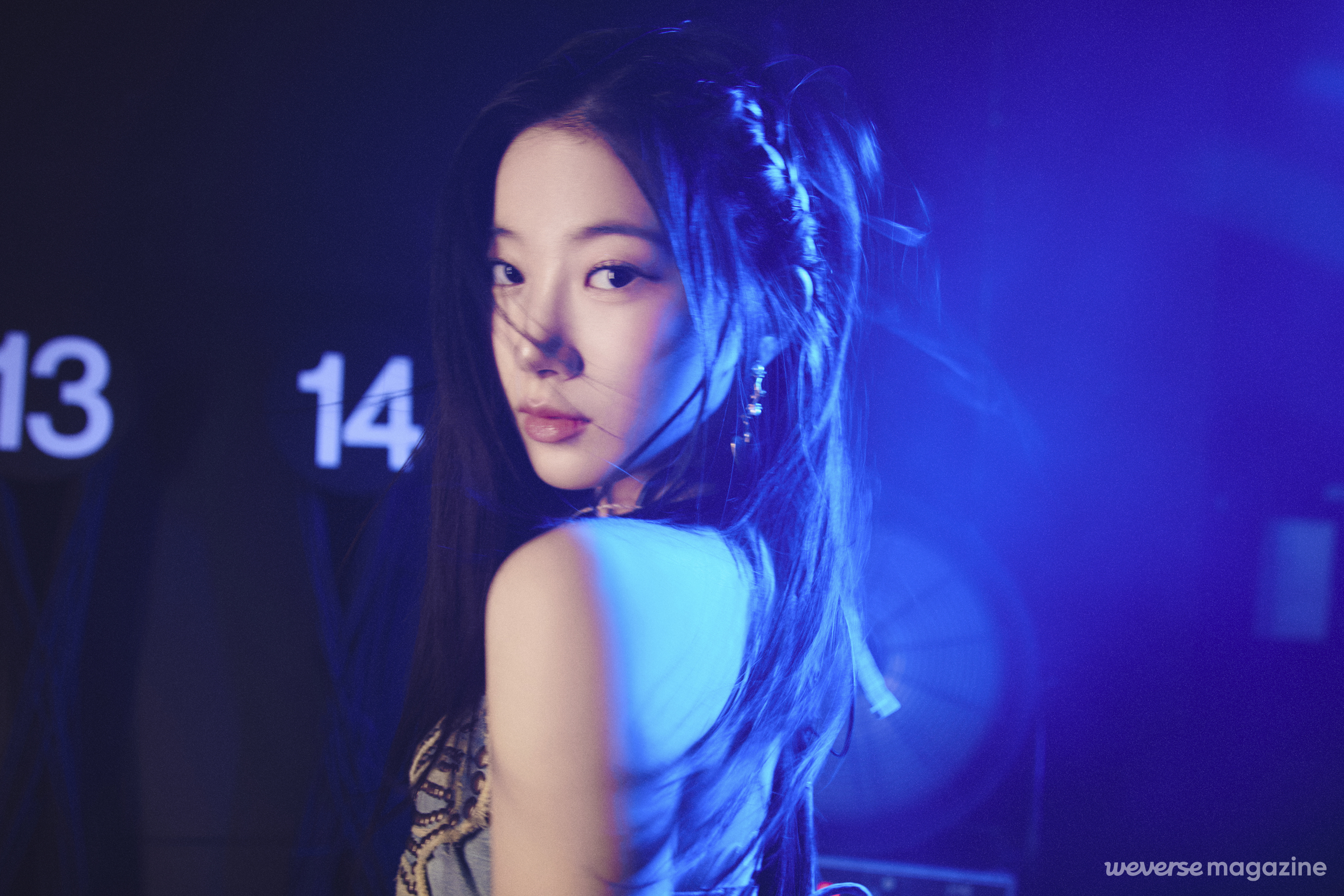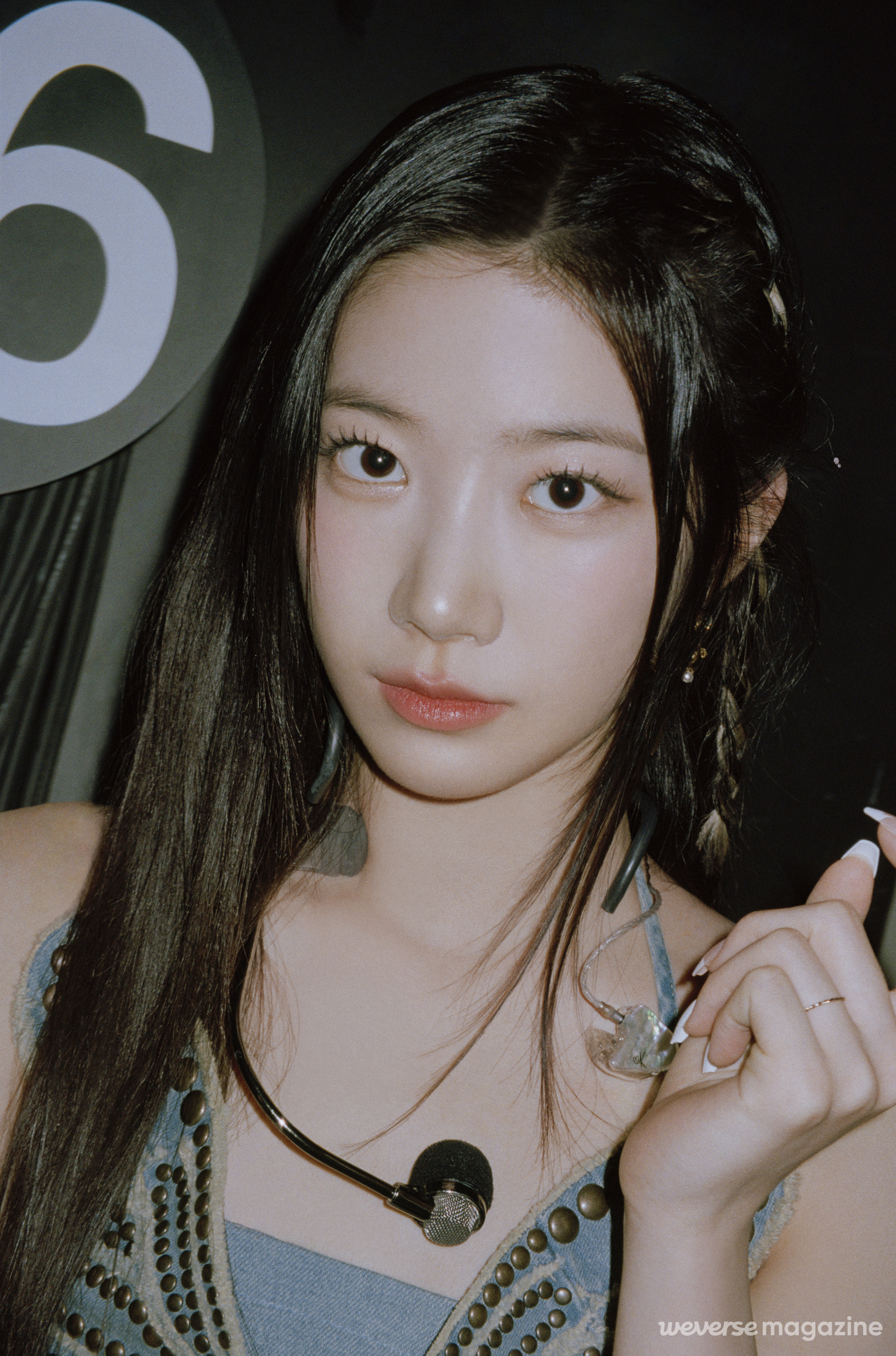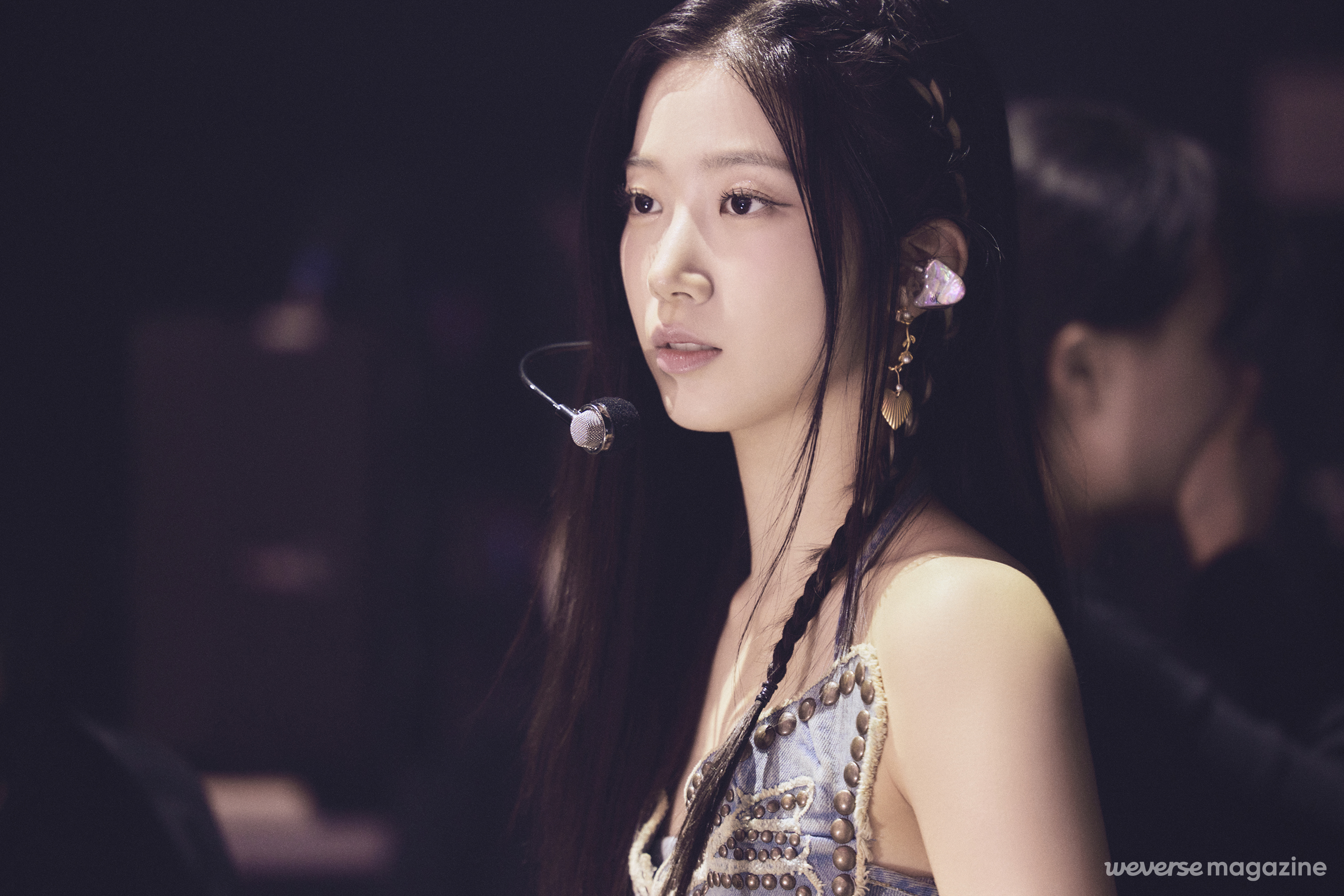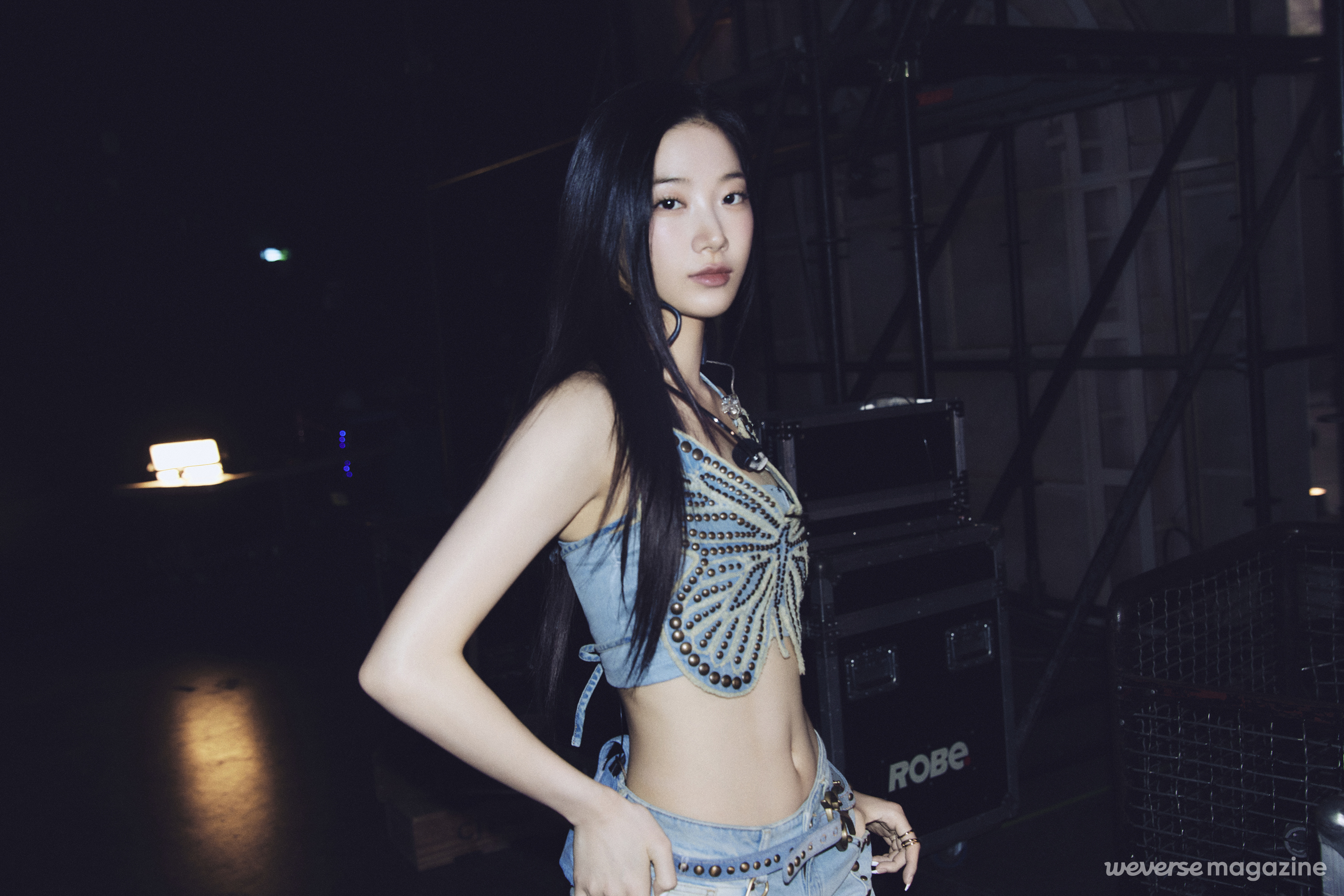You look like you’re enjoying all the different foods in Korea. What does it mean to you to eat something really tasty? (laughs)
KAZUHA: Eating something tasty equals happiness! (laughs) It relieves stress and makes me really happy. (laughs) Team Rice of our group orders all different kinds of things. I try every new food that comes my way, one bite at a time. I had rosé jjimdak recently and that was so good that it was almost emotional. I couldn’t stop eating it. (laughs)
How does it feel to cross things off on your bucket list on LENIVERSE, from going to the jjimjilbang to eating samgyeopsal?
KAZUHA: There were a lot of things I wanted to try in Korea and I really, really love them one by one on our show. (laughs) I’m happy that all these things I’m trying for the first time are on video so that I can watch them again later and enjoy them one more time.
It’s important to get things on camera. (laughs) Why is it you’re so dedicated to making content that you’d be willing to do things just for the sake of the video, like getting yourself into a risky situation in an abandoned building?
KAZUHA: All of us in our group absolutely love watching our own videos. (laughs) We find it fun watching ourselves being funny (laughs) so I like making them.
So does that mean you make content for your own enjoyment? Because it’s simply fun? (laughs)
KAZUHA: That’s part of it. (laughs) You’re right though. (laughs)
In your videos you’re speaking your mind more openly and your words and reactions have become much more lively than before. What’s changed?
KAZUHA: I used to not be able to talk even when I had something to say and I had a really hard time understanding what anybody was saying, but I’m having a lot more fun these days now that my Korean’s getting better. Now all the members know each other’s personalities and we know what makes each other laugh and what situations we really shine in so we can talk openly when we’re together and be ourselves. That’s how comfortable I’ve become.
You used to observe the other members and adapt yourself to suit the mood, but now it seems you feel confident taking charge in different situations.
KAZUHA: I feel like I’ve gotten the hang of it slowly. The other members are really funny and so sometimes I learned, thinking ‘that’s how you can make things funny’. (laughs) I learned how to be funny in Korean on camera from Kkura—like pretending you don’t know something. (laughs) The first variety show we were on before we debuted was Idol Human Theater and it made me think we were really bad on variety shows. Even while we were filming it we had doubts whether we were doing it right but as soon as I saw it I realized we were kind of funny. Then after we debuted and fans said they really liked when we were on variety shows I found out we were actually pretty funny. We just say whatever we want and feel really confident for some reason. (laughs) I think it’s important not to overthink things and just say whatever comes to mind.
That’s a good analysis coming from an “Osaka comedian.” (laughs) Do you really think being from Osaka impacted your sense of humor, like when you said “the spirit of laughter is in me” when you talked about dropping that egg bread?
KAZUHA: People from Osaka take pride in being funny. People from the city really like it when they’re told they’re funny so apparently that culture is a part of me too. (laughs) I don’t think I’m really a very funny person so it makes me feel that much happier when I make people laugh. (laughs) So I want to be funnier. (laughs) I thought everybody falls when somebody goes “bang!” I was so surprised that Koreans found it so funny. I was like, Is it really that funny? (laughs)
When I look at your early videos now, it’s hard to believe it’s really you.
KAZUHA: I guess I’ve been that way ever since I was little. I come across as quiet and shy but once I warm up to you I’m much more open and playful. (laughs) I have a feeling my parents would never crack jokes in public but they’re actually super funny and like funny things. So when it’s just family, we’ll do prop jokes, like, if there’s a banana around, they’ll go (imitates using a phone) like that. (laughs) When we see something with a funny shape we make jokes together like that. Our family likes being a little goofy. (laughs)
I remember how upbeat and goofy you were in your TikToks before you debuted. I feel like being an idol is an ideal lifestyle for you because it suits your naturally dynamic personality.
KAZUHA: I feel like there’s two different people inside of me. One is really imaginative—a freethinker who sees things differently from other people, but a little goofy. The other’s really serious, cautious and shy. They may seem like opposites, but when you think about most jobs, ballet included, you only ever show one side of yourself, whereas with idols, people not only see who you are onstage but also your life offstage, including the everyday side of you. I think being able to show the opposite sides of myself that make me who I am is part of what makes being an idol so fun.
Modelling for brands reflecting your image and identity must be a part of that too. What do you pay the most attention to when deciding what to do in front of the camera?
KAZUHA: I’m best at capturing a natural, pure image, and I think other people would agree. Your own style and vibe that you have within you naturally shows regardless of the concept. That’s how I learned that you can still showcase the brand’s charm while maintaining your own unique colors, not just sticking to one specific concept.
Speaking of expressing things your own way, I was really impressed with the facial expressions you use in “UNFORGIVEN” (feat. Nile Rodgers). You went above and beyond and added your own interpretation.
KAZUHA: I’m really happy to hear you say that. (laughs) The most challenging thing for me is facial expressions because I’m not as good at showcasing facial expressions as I thought. I always tried to look as pretty as possible for “FEARLESS” and in “ANTIFRAGILE” I had to stick out my tongue, which was really embarrassing at first (laughs) but I got used to it. For “UNFORGIVEN,” I thought it was important I look like the real me, so I practiced that. For the part where I’m crawling, I was going for a sad, tired girl in the rain at first, then when it goes, “target taboos,” I made a strong, determined face, and for the “watch me now” part I did a sort of twisted, confident smirk. The performance director told me I should switch between those three expressions and I did my best to make it work. It’s actually a really fast song and it’s frazzling thinking about the movements, facial expressions, all the feedback—so I practiced it at 0.7x speed first and then went from there.
You can really tell how much work you put in for your performance skills by watching how you deliver your moves in your part.
KAZUHA: Before this I was using ballet moves to show off who I am but I thought it was important to make a goal of showing I could do choreography that didn’t lean on that. I haven’t been doing hip hop choreography for long so it’s still hard for me overall, and every time there’s a new song I think, “How am I ever gonna do this?” (laughs) I’m still learning the basics and I’m going to have to work at them for a long time. Also I feel a bit pressure taking on the intro part - which is very important - so I’m practicing really hard.
Did you have fun with all the different kinds of rap styles?
KAZUHA: Well, rapping’s really cool. (laughs) I like it because I feel cool whenever I rap. (laughs) I’m used to hearing myself rap now, although sometimes when I’m recording I feel like I’m overdoing it, but I’m trying to be even bolder anyway. I’m still not that confident and I don’t really feel certain about my vocal tone or know what kind of voice is the best for me so I want to keep trying to find my own unique vocal style. The more I try, the better I want to become.
Your high, clear voice is full of emotion and comes across well throughout the songs on the album. Was there any new approach you took while recording?
KAZUHA: I felt it was really important to pay attention to my facial expressions and other little details while trying to bring out the emotions in each song. With “UNFORGIVEN,” for example, I was trying to do the intro dark and aloof at first, but then the producers said I should smile like I was teasing someone so I changed my face to be more care-free and somewhat “annoying”. (laughs) It was amazing the way the tone of my voice changed with my facial expression and I could really hear the difference later.
You wrote lyrics for the first time for “FEARNOT (Between you, me and the lamppost),” right?
KAZUHA: We’ve shared secrets and times with FEARNOT that no one but the light of the lamppost knows about. When I was writing the lyrics, I was thinking about how we can rely on each other and how we’ll make our way in the world together, like a story. They ended up using a part I never would’ve guessed they’d take as the opening line. First I wrote my thoughts down in Japanese, then I translated it to Korean and spent some time thinking about which parts to remove to make it work as lyrics. It was really hard but I always thought it was so cool and lovely the way YUNJIN can say what’s on her mind through music, so now I keep thinking that I want to be an artist like her.
This album shows off a whole new side to you. It makes the line, “I follow my dreams—I do what I want,” feel even more powerful.
KAZUHA: Some people might question whether it’s possible to succeed if you give up what you’ve been doing all along and try something new. They might see it as risky and reckless, but even though I’d never done anything related to K-pop, I was able to get closer to making my dreams come true just by signing up for an online audition. Now I can say with confidence that just having even a little faith that your goal might be possible, and making a move on it—even if it’s a small step—brings you closer to your dreams, even if they seem impossible. That’s why I wanted to show off how I’ve grown on this album rather than my past or what I was always good at, and I hope people will enjoy that.
It seems like you’re enjoying all these new experiences. What kind of label would you put on your life as an idol? Like how HONG EUNCHAE has EUNCHAE’s Star Diary.
KAZUHA: Oh! Maybe Zuha Checks Off Her Bucket List? (laughs) I checked a lot of things off my list since I debuted and I’m always excited to try things for the first time with EUNCHAE. We’re like, Wow! (laughs) I added “being onstage at Coachella” to my list a little while ago after seeing BLACKPINK’s amazing and brilliant performance there. You have to dream big. (laughs) I want to try hosting a show, and acting someday, and I’d like to try writing songs, and these days I’m even more interested in being a brand ambassador. There’s so much I want to do. (laughs)
I’m sure you can achieve anything thanks to FEARNOT’s support.
KAZUHA: I’m still amazed we have FEARNOT. Everyone has someone there to support them, but the support idols get from their fans is readily visible. It makes me so happy to receive their constant love and support. Lots of times I learn new things about myself thanks to FEARNOT. I absolutely cherish them for the way they see me from their own perspective and understand me better than I understand myself.
It seems the inner stability you made for yourself while working so hard in one area for so long has created a foundation of energy for you to take on new challenges.
KAZUHA: Remember when I said it’s like there’s two different people inside of me? In the same way, I feel like it’s fine if I’m on a variety show or something similar and I slip up or do something weird (laughs) but when it comes to the stage or something else really important I get all serious and really afraid of making any mistakes. Maybe it’s because I placed so much importance on maintaining a professional attitude when I did ballet but I feel like I always have to do well and can’t make any mistakes, and sometimes I’m really afraid I won’t be able to do that. That’s why I’m glad I’m part of LE SSERAFIM. That feeling was especially strong during the year-end performances last year. I’m really proud of how we’re all serious about our performances and how we make sure to put on performances that we can even impress ourselves with.
There’s one more way you overcome your fears: “The one who enjoys, wins.”
KAZUHA: Nobody cares what other people think of them when they’re young. It’s like, as long as you enjoy what you’re doing, it doesn’t matter what other people think. But as you grow up, you start paying more attention and you start to get worried. When that happens to me, I think back to my childhood: doing exactly what I wanted to, not trying to hide who I am—just being the real me. I think that’s how I can enjoy myself and “win.” I’m trying not to forget that. (laughs)



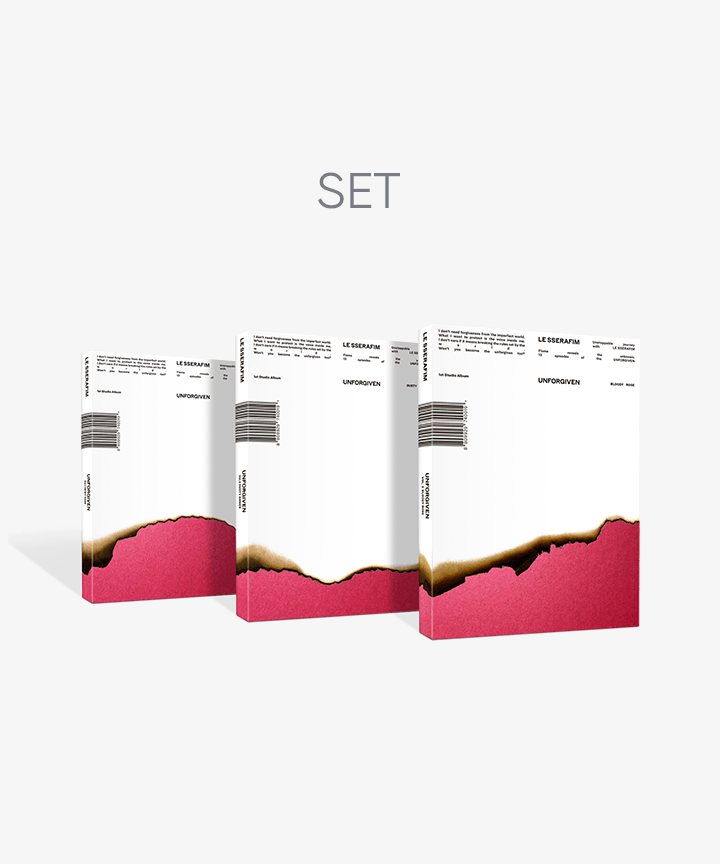
Unauthorized reproduction and distribution prohibited.
